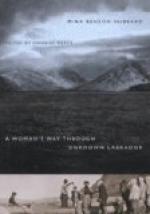It seemed very fine to have another good day’s work behind and I felt less heavy hearted. Some thinking had convinced me that the two months’ estimate for the journey to Ungava was far from correct; but I still feared it was useless to entertain hope of being in time for the ship. Yet one does hope even when it is plainly useless. Nevertheless life had come to be a serious matter with us all now, excepting Gilbert, for the men too were averse to spending a winter in Labrador, and had rather advocated a return by way of Davis Inlet or the Grand River. Gilbert alone sang and laughed as merrily as ever, undisturbed by doubts or fears.
That evening the sunset was of clear gold and the sudden chill, which in Labrador always follows, sent me shivering to the camp fire where, below the bank, on the solid, smooth-worn rock of the river-bed, we had supper of ptarmigan. But neither hunger nor perplexities could shut out the impress of the desolate grandeur of our surroundings. This was the wilderness indeed with only the crystal river and the beautiful skies to make it glad. Only? Or was there more? Or was it glad? Perhaps, yes surely, somewhere within it there was gladness; but everywhere it was beautiful with the beauty which alone, to some hearts, can carry the “still small voice.” If only it would never say, “What dost thou here?” One must wish to stay and listen to it always.
Through the stillness came up the sound of the rapids below our camp. Above, fish jumped in the quiet waters where the after-glow in the sky was given back enriched and deepened. Then came night and the stars—bright northern lights—bright moon—shadows on the tent—dreams.
A ptarmigan whirred up, from the corner of my tent and I awoke to find the sun shining and everything outside sparkling with frost. The men had already begun portaging, for below camp the rapids were too heavy to take the outfit down; but when breakfast was over and the last load had been taken forward over the half-mile portage, the canoes were run down the river.
A short distance below, the river drops rapidly round many little islands of pink and white rock by a succession of picturesque falls and rapids and chutes extending for more than a mile and here a number of short portages were made. We reached the last of the islands shortly before eleven o’clock and then landed to climb a hill to the east. It rose six hundred and thirty feet above the river, but the view from the top afforded us little satisfaction so far as the route was concerned. The river could be seen for only a few miles ahead, flowing away to the northwest towards higher hills, where we could see patches of snow lying. Some miles to the east was a large lake, its outlet, a river of considerable size, joining the George River three-quarters of a mile north of where we had left the canoes. Below the junction there were many Indian signs along the shores, and we knew that there the portage route of which the Montagnais women had spoken, must lead to the river again. Steadily through the afternoon we approached the higher hills, ever on the watch for the Nascaupee camp; but we did not find it.




